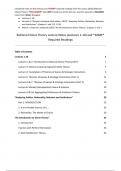Class notes
Rational Choice Theory Lecture Notes (Lectures 1-10) and *SOME* Required Readings - GRADE 8,0
- Course
- Institution
- Book
Combined notes on the lectures and *SOME* required readings from the course (2023) Rational Choice Theory. *DISCLAIMER* does NOT include any of the lectures’ practice questions. INCLUDES notes from (Total: 38 pages): Lectures 1-10. Kenneth A. Shepsle’s textbook (2nd edition, 2010) “Anal...
[Show more]




